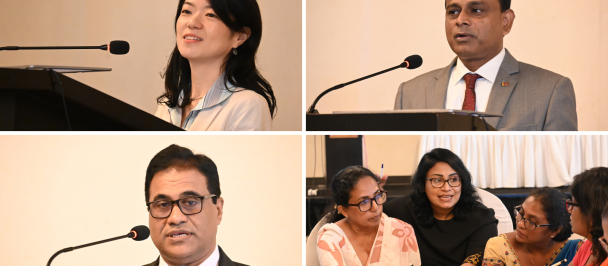Robert Juhkam, Resident Representative, UNDP Sri Lanka
*Check against delivery*
Greetings, and Good afternoon
Hon. Minister Mahinda Amaraweera - Minister of Environment, Dr. Anil Jasinghe - Secretary, Ministry of Environment, Mr. AWM Rifa Wadood - Director International Relations, Ministry of Environment, Prof. K.B. Ranawana - Ecological Association of Sri Lanka, Emeritus Prof. P. Wickramagamage - the University of Peradeniya, Officials from the Ministry, UNDP Small Grants Programme Colleagues, partners and friends.
COVID-19 provides us with an opportunity to rethink our relationship with nature, in a way unthinkable even six months ago, in individual, societal, and political terms.
An opportunity to challenge business as usual.
Many governments have prioritised ‘green future development’, including Sri Lanka also based on UN’s Advisory Paper to GoSL submitted last year in July to the Hon. Chair PTF on Socio-economic recovery.
Unfortunately, though, we are missing the mark. According to a new UN report by UNEP and the University of Oxford, of the $1.9 Trillion USD that the world’s 50 biggest economies announced in recovery spending by the end of 2020, only 18% can be considered “GREEN”. Yes, rescue spending is crucial, but pouring billions into reinforcing polluting industries and bad environmental practices only undermines societies’ future biodiversity, increasing carbon footprint, and the like. Growth at any cost is a bad choice because ultimately the costs will be paid at an even higher price when we calculate the actual costs on the environment, eco-systems and ultimately food security and people’s health.
The Global Environmental Facility (GEF) Small Grants Programme (SGP) of UNDP has been in operation in Sri Lanka since 1994 and has funded over 450 projects worth over US$ 10.78. These have focused on biodiversity conservation, abatement of climate change, protection of international waters, prevention of land degradation and elimination of persistent organic pollutants.
The current phase of GEF aims to enhance social and ecological resilience through community-driven projects. And it supports alternative livelihoods in three ecologically sensitive landscapes: the Coast from Mannar Island to Jaffna, Knuckles and Colombo Wetlands. Currently, 30 projects are in operation.
As I’m informed, this Atlas being presented today is the product of a project funded in the Mannar landscape implemented by the Ecological Association of Sri Lanka. It is nice to see: I am older, I remember dictionaries, encyclopedias, maps.. great to see an ATLAS, big and bold.
UNDP and UNDP GEF appreciate this work and are proud to be associated with this first-ever ecological Atlas produced of the Northwestern Coastal Region, with mapping key ecosystems in 35,000 hectares with breadth and depth, including mangroves, lagoons, estuaries, salt marshes, mudflats and sand dunes present in the landscape. Both, flora and fauna, and the threats faced by them. As you can see, highly comprehensive, hence its value.
The environment plays a fundamental role in determining economic outputs and human well-being. Thus, integration of the value of natural capital into policy and decision making is crucial.
In the COVID setting one year ago, the moment human influences on our environment and surroundings were reduced due to lockdowns, nature bounced back. This reminds us to recognize the fundamental role of nature in everything from corporate bottom lines to human well-being, to the survival of life on Earth.
In this sense, we are glad to note the Government of Sri Lanka’s high priority towards mangrove cover including funding mechanisms.
UNDP Sri Lanka through the GEF Small Grants Programme remains steadfast in our support to GoSL with environmental management policies, promoting nature-based tourism, and overall contributing towards the economic independence of families in the region.
UNDP places a high value on collaboration with MoE, civil society, environmental organizations, the private sector and others.
Again, congratulations to the authors and organizations, and thanks for this gift, the ATLAS. I am confident that this valuable Atlas will be important for a cleaner and greener Sri Lanka.
****

 Locations
Locations





